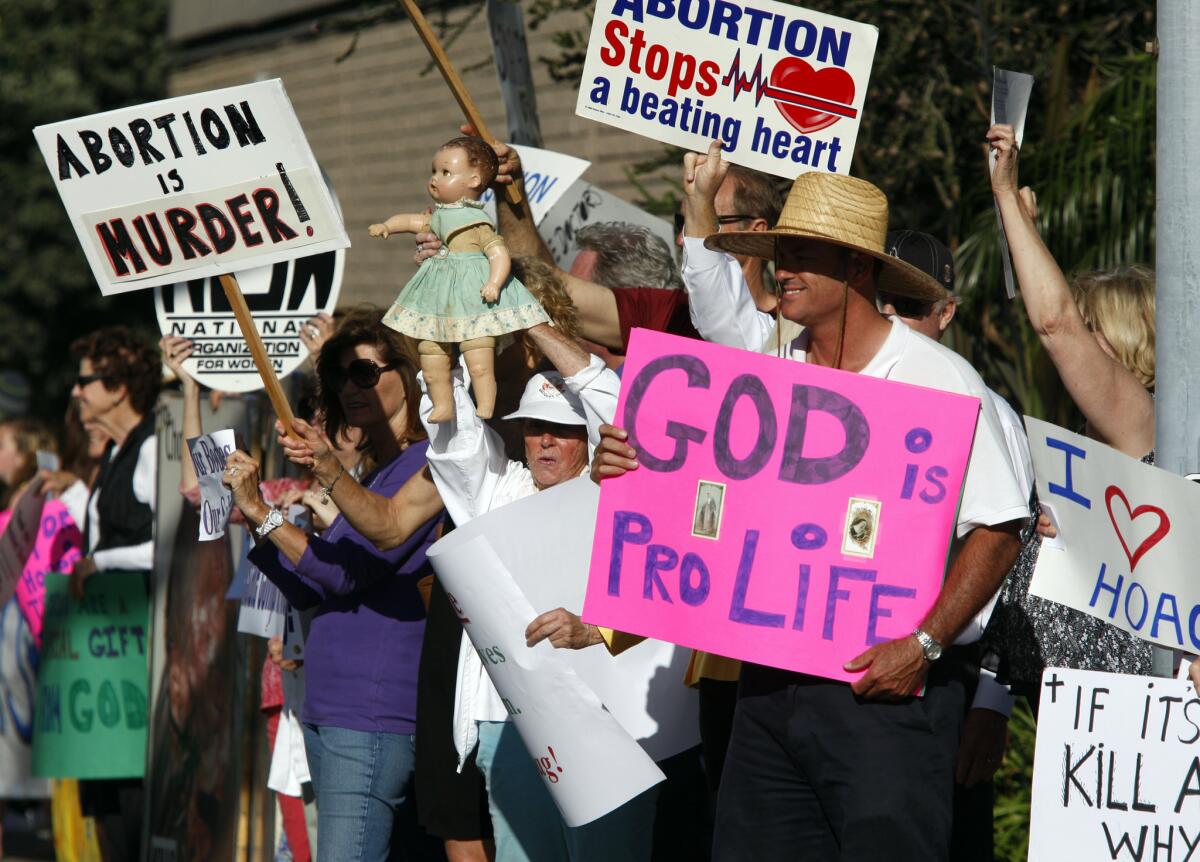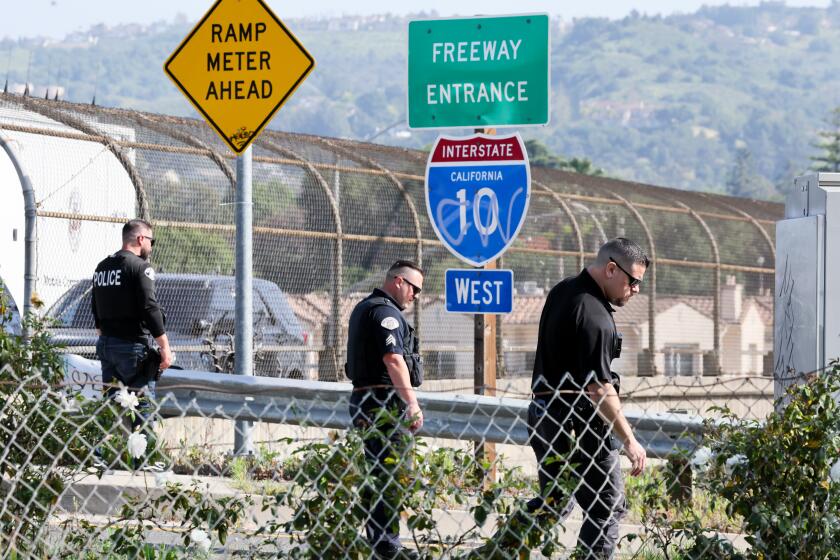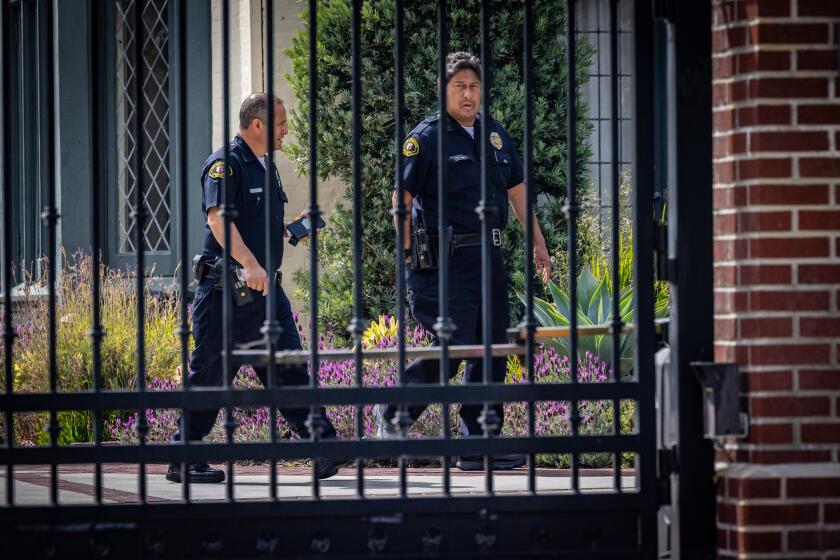ACLU sues Catholic bishops over view that abortion is evil

Everyone knows that Catholic hospitals don’t perform elective abortions. Incomprehensibly, Catholic hospitals even fall afoul of the church if they perform an abortion to save a mother’s life.
But are they negligent if they fail to merely inform a pregnant woman that abortion is the safest option when her health is in danger and her fetus faces certain death? And that if she wants an abortion, she should seek help elsewhere?
That’s the crux of the issue in a negligence lawsuit filed by the ACLU on behalf of Tamesha Means, a Michigan woman whose local hospital treated her with Tylenol and sent her home twice after her water broke 18 weeks into her pregnancy. The suit alleges that the hospital, the only one within 30 miles of Means’ home, did not tell her that her fetus was doomed, nor that inducing labor and terminating the pregnancy was the only way to reduce the risk of a dangerous infection.
But there is a twist in this case.
Instead of filing suit against Mercy Health Partners, the Muskegon, Mich., hospital where the incident took place, the ACLU took the unusual step of suing the U.S. Conference of Catholic Bishops, which sets the rules for Catholic hospitals on many aspects of care, including abortion.
The rules, which apply theological principles to the practice of medicine, are laid out in a document, “Ethical and Religious Directives for Catholic Healthcare Services.” Certain medical procedures, the bishops say, are “intrinsically” evil; among them abortion, assisted suicide and sterilization.
The case, which was filed in federal court Friday, comes at a moment when the clash between religious beliefs and healthcare is playing out in courts across the country.
Last week, the Supreme Court agreed to hear a case challenging President Obama’s signature healthcare reform law, which requires health plans offered by for-profit companies to include contraception coverage. Hobby Lobby, a craft company owned by a Christian family, has claimed the rule infringes on its religious beliefs.
“The lawsuit is not about abortion or contraception,” said Kary L. Moss, executive director of the Michigan ACLU in a conference call with reporters Monday. “It involves access to adequate emergency medical care.” The bishops, she said, are “ultimately responsible because of the directives.”
The plaintiff in the lawsuit, Means, a 30-year-old mother of four, said she suffered “severe, unnecessary, and foreseeable physical and emotional pain and suffering” when she was treated over a three-day period in December 2010. On her third visit to the hospital, suffering from two acute infections and in extreme pain, she delivered a premature baby, in the breech, or feet-first, position. The baby died 2-1/2 hours later.
The hospital, she said, never told her the baby’s life was in jeopardy after her water broke, and as a result, the suit contends, she was unprepared for the turn of events, and devastated. Means is seeking damages, said Moss, and an admission that the bishops’ actions were negligent.
Neither the bishops nor the hospital have responded to the lawsuit.
“The case is in many ways simple and strikes at basic values…and a super simple proposition,” said ACLU National Deputy Legal Director Louise Melling. “You expect medical professionals to provide care appropriate to your condition and offer information about your alternatives. That’s not what happened to Tamesha Means.”
The Catholic heirarchy can extract a heavy price from hospitals that disobey the rules. In 2010, St. Joseph’s Hospital and Medical Center in Phoenix was stripped of its affiliation with the church after doctors performed an abortion on a woman who was 11 weeks pregnant in order to save her life. She had a condition, pulmonary hypertension, that had a nearly 100% chance of killing her had her pregnancy continued.
The hospital’s president, Linda Hunt, was unrepentant: “If we are presented with a situation in which a pregnancy threatens a woman’s life, our first priority is to save both patients. If that is not possible, we will always save the life we can save, and that is what we did in this case. Morally, ethically, and legally, we simply cannot stand by and let someone die whose life we might be able to save.”
Curious to see how they read, I looked up the bishops’ directives. The document says lovely and high-minded things about the healing mission of Jesus Christ. It talks about compassion, and about “Christian love” as the animating principle of healthcare delivered in Catholic hospitals.
But when it comes to dangerous pregnancies, compassion is only available to the unborn child. A suffering mother in the midst of a dangerous miscarriage is pretty much out of luck.
There appears to be only one situation where putting a mother’s life above her unborn child’s is permissible, according to the directives: “Operations, treatments, and medications that have as their direct purpose the cure of a proportionately serious pathological condition of a pregnant woman are permitted when they cannot be safely postponed until the unborn child is viable, even if they will result in the death of the unborn child.”
I guess that means if a pregnant woman has cancer and needs lifesaving treatment that is incompatible with pregnancy, she can have her treatment. But if her life is at risk from a complication of the pregnancy itself, too bad for her. She can die with the baby.
Last year in Ireland, where abortion remains illegal in almost all cases, this exact scenario played out. Savita Halappanar, a 31-year-old dentist, began miscarrying 17 weeks into her pregnancy. She and her husband pleaded with doctors at Galway University Hospital to induce an abortion, but they refused, telling the couple “this is a Catholic country.” (Halappanar was Hindu, of Indian origin.) She developed a raging infection. Rather than terminate the pregnancy, her doctors allowed her to die of multiple organ failure.
How very life-affirming.
Could that happen here? Means, it turns out, was not the only miscarrying woman who did not receive the normal standard of care at Mercy Health Partners. Her case was discovered by a public health educator working on a federally funded infant and fetal mortality project, who also found four other, similar cases where the hospital failed to induce labor in pregnant women whose membranes had broken before their fetuses were viable.
According to the lawsuit, when the educator brought the cases to the attention of Mercy Health Partners’ vice president of mission services, Joseph O’Meara, he said the decision not to induce labor was proper because the bishops’ directives prohibit such a thing.
“While we are all entitled to our religious beliefs,” said Dr. Douglas Laube, a past president of the American Congress of Obstetricians and Gynecologists who was on the ACLU conference call, “hospitals should not be allowed to impose them on patients and staff who do not share them.”
At the very least, a pregnant woman in danger must be told what her condition is and what her options are. What the bishops think is beside the point.
ALSO:
Paul Walker crash: Autopsies planned Tuesday for actor, driver
Student is 3rd rave drug fatality in San Bernardino County since 2006
Twitter: @robinabcarian
More to Read
Start your day right
Sign up for Essential California for news, features and recommendations from the L.A. Times and beyond in your inbox six days a week.
You may occasionally receive promotional content from the Los Angeles Times.







